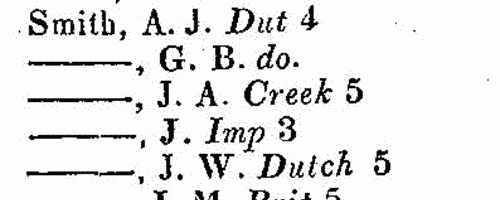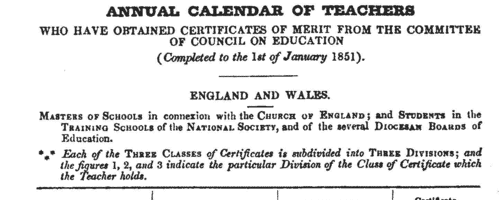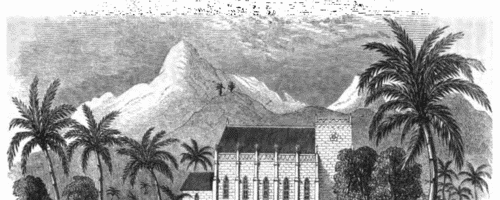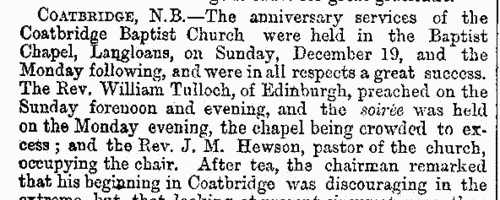Edmund Surname Ancestry ResultsOur indexes 1000-1999 include entries for the spelling 'edmund'. In the period you have requested, we have the following 100 records (displaying 81 to 90): Single Surname Subscription | | | Buying all 100 results of this search individually would cost £550.00. But you can have free access to all 100 records for a year, to view, to save and print, for £100. Save £450.00. More... |
These sample scans are from the original record. You will get scans of the full pages or articles where the surname you searched for has been found. Your web browser may prevent the sample windows from opening; in this case please change your browser settings to allow pop-up windows from this site. Dividends of bankrupts' estates
(1836)
Dividends from moneys raised from bankrupts' estates in England and WalesEDMUND. Cost: £6.00.  | Sample scan, click to enlarge

| Insolvents
(1836)
Insolvency notices for England and Wales: insolvency often caused people to restart their lives elsewhere, so these are an important source for lost linksEDMUND. Cost: £6.00.  | Sample scan, click to enlarge

| European Residents in Canton
(1839)
The Anglo-Chinese Kalendar, printed in Canton in the 19th year of the reign of Emperor Taou-Kwang, lists European merchants, residents and members of societies, as well as including a brief chronicle of events for the year. EnglishEDMUND. Cost: £6.00.  | Sample scan, click to enlarge

| Bankrupts' Assignees
(1841)
Assignees of bankrupts' estates (usually principal creditors and/or close relatives of the bankrupt) in England and WalesEDMUND. Cost: £6.00.  | Sample scan, click to enlarge

| Anglican Schoolmasters
(1850)
The Committee of Council on Education awarded certificates of merit to teachers throughout Britain, and published annual lists of those qualifying in the previous years. Masters and mistresses are listed separately, with surname and initials, and school at which teaching, post town or county, and grade of the certificate: each of the three classes of certificate being subdivided into three. There are five separate lists for masters and mistresses:
1. Teachers in schools in connexion with the Church of England; male students in the Training Schools of the National Society, and of the several Diocesan Boards of Education; and female students in the Training Schools of the National Society (Whitelands, Chelsea), the Home and Colonial School Society (Gray's Inn Road, Holborn), and the Salisbury and York and Ripon Diocesan Boards of Education.
2. Teachers, in England and Wales, of British, Wesleyan and other Protestant Schools, not in connexion with the Church of England;
3. Teachers, in England and Wales, of Roman Catholic Schools;
4. Teachers of schools in Scotland, in connexion with the Established Church; male students in the Edinburgh and Glasgow Training Colleges; and female students in training schools.
5. Teachers of schools in Scotland, not in connexion with the Established Church; male students in the Training Schools of the Free Church (at Edinburgh and Glasgow); and female students in training schools.
This is the list, corrected to 1 January 1851, published in 1851.EDMUND. Cost: £4.00.  | Sample scan, click to enlarge

| Missionary donations from Scotland
(1855)
The Congregational and a number of other independent churches together formed the Evangelical Alliance, committed to promoting and supporting missions to the heathen. The areas chosen for their projects were Guiana, South Africa, India, the South Seas and China. The work of the missionaries was not only in preaching the Gospel, but also in translating the Bible into local languages, and establishing churches, schools and orphanages. Orphans and native teachers were often given the names of principal contributors or congregations back in Britain. In Britain the large amounts of money needed for this work were raised among the Congregational and independent congregations, arranged by auxiliaries for each county (although some contributions for each county might in fact come in from congregations and individuals in neighbouring areas); money was gathered by ministers, at special services, by supporters, and in missionary boxes. The accounts of all these contributions were published as part of a monthly magazine called the Evangelical Magazine. Each issue of the magazine carried obituaries of prominent members of the congregations; general articles on religion; reviews of newly-published religious books; home news, mainly about meetings of importance or interest by the alliance or in individual churches; and then a separate section called the Missionary Chronicle. The Missionary Chronicle was devoted to letters and reports from the missionaries; and concludes with a set of accounts of donations towards the missionary work. This is the index to the donations reported in the magazine, January to December 1855, from Scotland.EDMUND. Cost: £6.00.  | Sample scan, click to enlarge

| Schoolmasters and trainees with Certificates of Merit
(1856)
The Committee of Council on Education for England and Wales produced an annual report which included several lists of teachers and trainee teachers, including an Annual Calendar of Teachers who have Obtained Certificates of Merit (completed to 1 January 1856), from which this sample scan is taken. The teachers are listed alphabetically by surname and initial, with name of school, post town or county, and grade, as either certificate or class. Student teachers were classed at the end of each year of training, so the column for class shows a student's class (1, 2 or 3) at the end of their first or second year of training. The teacher may then be awarded a certificate of merit by Her Majesty's Inspector, in which case the class and division of the certificate awarded appears in the columns for Certificate. No certificate of merit was granted a student, as a teacher, until he or she had been for two years in charge of the same elementary school, and the certificate was granted on the basis of two reports of performance as a teacher in school. If the first report was favourable, the teacher was paid for the first year on the scale of the lowest class; if the second report was favourable, augmentation and class of certificate was fixed for the next five years, after which (and so on from time to time) the certificates were open to revision. The value of the certificate, in the first instance, was not fixed higher than the first division of the third class, for any student who had resided less than two years at a training school under inspection. This is the index to the schoolmasters and male students in training schools. EDMUND. Cost: £6.00.  | Sample scan, click to enlarge

|  Persons of standing recommending London police recruits
(1843-1857) Persons of standing recommending London police recruits
(1843-1857)
The Metropolitan Police Register of Joiners (MEPO 4/334) lists policemen joining the force 1 January 1843 to 1 April 1857 (warrant numbers 19893 to 35804). The register is alphabetical, in so far as the recruits are listed chronologically grouped under first letter of surname. It gives Date of Appointment, Name, Number of Warrant, Cause of Removal from Force (resigned, dismissed, promoted or died), and Date of Removal. Although the register was closed for new entrants at the end of 1842, the details of removals were always recorded, some being twenty or more years later. Those recruits not formerly in the police, the army, or some government department, were required to provide (normally) at least two letters of recommendation from persons of standing, and details of these are entered on the facing pages. Where a recruit was only recently arrived in the metropolis, the names and addresses of the recommenders can be invaluable for tracing where he came from. Those recruits not formerly in the police, the army, or some government department, were required to provide (normally) at least two letters of recommendation from persons of standing, and details of these are entered on the facing pages: the names in these are indexed here (the police recruits are indexed separately and not included here). Recruits transferred from other forces or rejoining the force did not normally need recommendations - in the latter case, former warrant numbers are given - but some recommendations are from police inspectors, even other constables. Recruits coming from the army sometimes have general military certificates of good conduct, but most often have a letter from their former commanding officer; recruits recommended by government departments (most often the Home Office) similarly have letters from the head of department. But the great majority of the names and addresses in these pages are of respectable citizens having some sort of personal acquaintance with the recruit. Where more than two recommendations were provided, the clerk would only record one or two, with the words 'and others'. Tradesmen are sometimes identified as such by their occupations; there are some gentry. Although the bulk of these names are from London and the home counties, a scattering are from further afield throughout Britain and Ireland. EDMUND. Cost: £8.00.  | Sample scan, click to enlarge

| Scottish Partnerships Dissolved and Bankruptcy Proceedings
(1857)
Dissolutions of business partnerships, and proceedings in bankruptcy in ScotlandEDMUND. Cost: £6.00.  | Sample scan, click to enlarge

| Baptists
(1876)
The Baptist was a weekly newspaper, with some general news and political coverage, but mainly devoted to chronicling Denominational Intelligence, i. e. the doings of the Baptist churches in Britain and Ireland. January to June 1876.EDMUND. Cost: £6.00.  | Sample scan, click to enlarge

|
Research your ancestry, family history, genealogy and one-name study by direct access to original records and archives indexed by surname.
|













